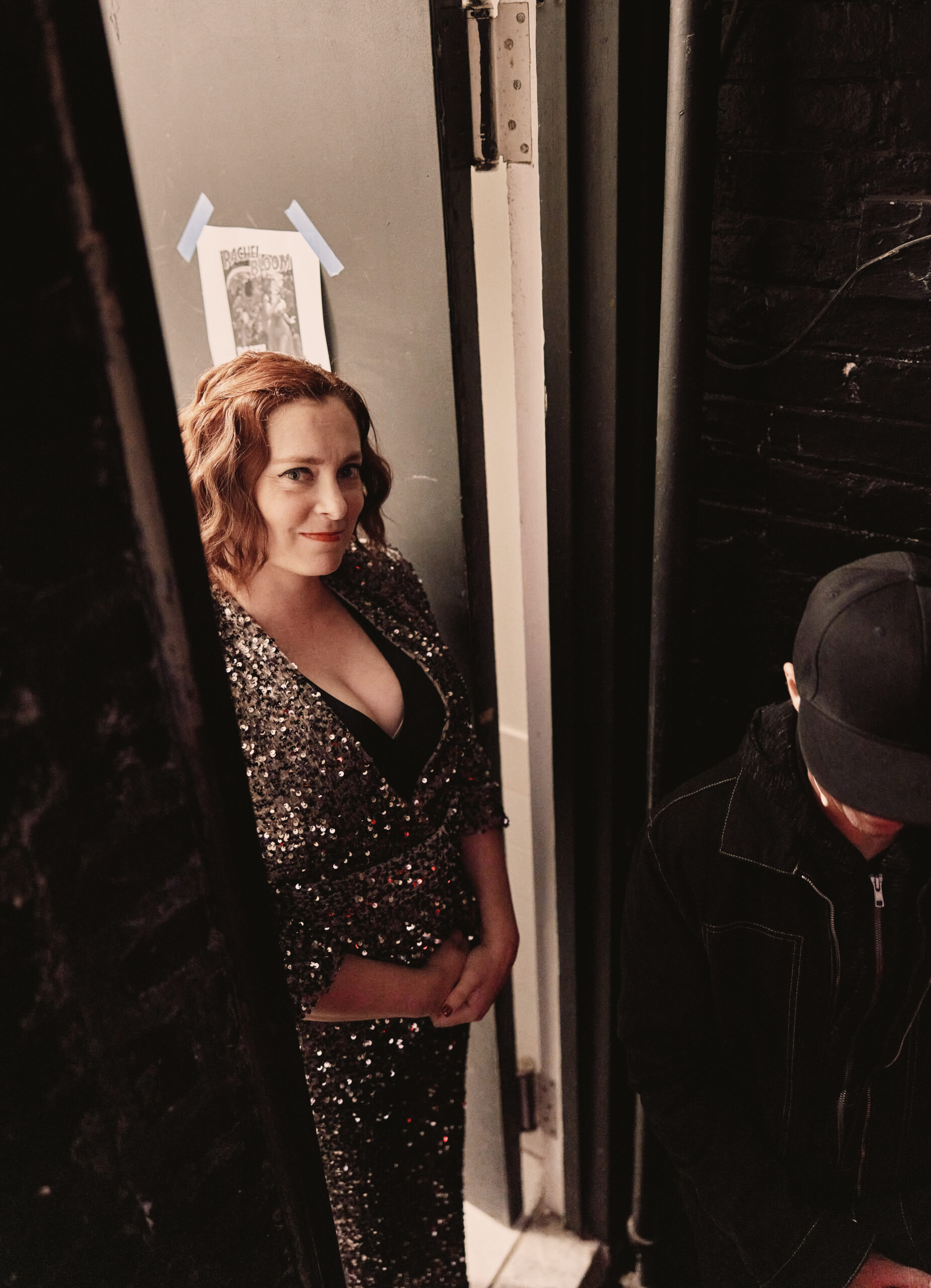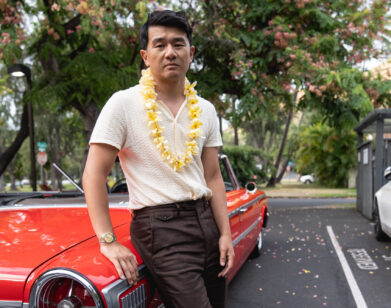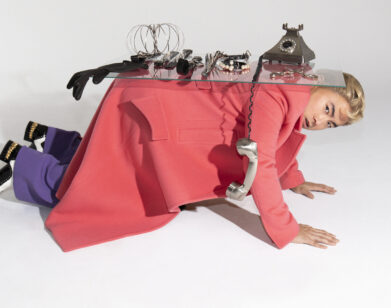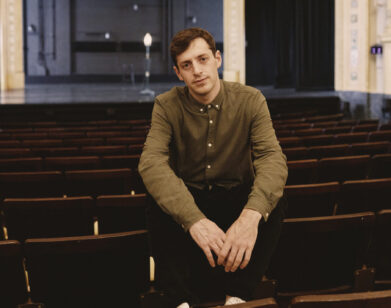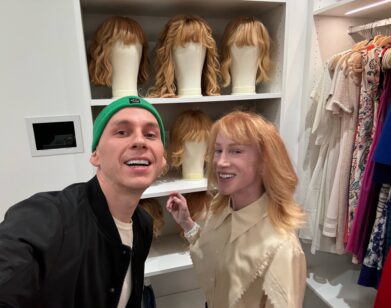DEATH
Rachel Bloom is Having Her Patti Lupone Moment
Rachel Bloom has never shied away from infusing her comedy with uncomfortable topics. Her television show Crazy Ex-Girlfriend, which ran for four seasons, was a musical comedy that also dealt with her character’s borderline personality disorder. So you can imagine her one-woman show at the Lucille Lortel Theatre in New York, Death, Let Me Do My Show, is about exactly what its title suggests. In it, we watch Bloom attempt to perform a show she created in 2019, pre-Covid, when things were “normal,” and before she gave birth to her daughter in the Neonatal Intensive Care Unit in 2020. Simultaneously, she lost her friend and musical collaborator Adam Schlesinger, and her psychiatrist. So, on stage, Bloom finds herself confronting death itself in the form of an audience heckler, who then dramatically alters the course of the show.
The last time I spoke to Rachel, I interviewed her for my podcast, “Keep It” in November 2020, just after the release of her memoir I Want to Be Where the Normal People Are. Those traumatic events of 2020 were still fresh, but she felt she had to include them in her book. To go on without acknowledging them would feel crass. In Death, she goes a step further, offering herself catharsis and her audience a roadmap for how to honor death’s role in life without detracting from the gift of motherhood. During the show’s closing week, I hopped on Zoom with Bloom to discuss everything from crafting the show, how to be a good friend, and how hot Arthur Miller used to be.
———
IRA MADISON: Well, it’s good to see your face after seeing it last night, too.
RACHEL BLOOM: Wait, you came last night?
MADISON: I came to last night’s show.
BLOOM: Oh, you should have stayed and said hi.
MADISON: It was fantastic. I really love the show.
BLOOM: Thank you so much.
MADISON: I had no idea what to expect. What’s really interesting about the inclusion of death in the show is you start with the heckling moment. Have other people reacted to that moment in the show angrily, thinking someone is actually heckling you at your show? Because I thought it was real.
BLOOM: And that’s kind of the intention, to make that moment feel as real as possible so that my character in the show doesn’t know what’s happening. Last night was one of the more reactive audiences. People were angrier than usual. I think a theater audience especially shocked, since they’re not used to hecklers.
MADISON: I was very excited for you to have your Patti LuPone moment.
BLOOM: Yes, and Patti actually came to the opening and I texted her like, “Just to let you know, there’s a heckler in the show.”
MADISON: She would’ve gotten up and defended you herself.
BLOOM: Well, this is a whole other thing, but at opening night, unbeknownst to me, an audience member passed out right next to Patti. And Patti was fanning her with her purse! I had no idea this was going on at all.
MADISON: I feel like these things follow Patti LuPone around because when I saw Gypsy, when she was in it, that was the night that part of the ceiling fell in the balcony and hit a woman.
BLOOM: I heard about this.
MADISON: Maybe she’s death.
BLOOM: If Patti LuPone’s death, I’m like, “Take me.” I trust you inherently into your bosom.
MADISON: I want to talk about crafting this show. The concept of it is: “I was going to do my standup show in 2019 and then I wasn’t able to do that, because COVID happened. I had a baby. My friend passed away. My shrink passed away.” How did you decide to make this show, then? When did it come to you?
BLOOM: I really was planning a standup show. It was going to be more of a special, back when the special market wasn’t in shambles. When I was touring with Crazy Ex, I had been basically slowly working in new songs and stand-up, and then I went to Montreal. I did a five-day residency and I did half new stuff, half old stuff. One day when my daughter was probably two months old, we were in it. Adam [Schlesinger, Bloom’s writing partner] had just died. It was probably like 6AM and I was playing with her and I was exhausted and I was looking at the whiteboard of this special. When you write out shorthand for comedy bits, it looks so incredibly stupid where it’s like, “cum, piano, God, Mary,” and it all looks so frivolous. I was looking at that board and a part of me was like, “I don’t want to throw away all the work I did.” What if I do a lot of this material, but death was in the audience, because that’s what it felt like. It felt like death was a heckler in my life, fucking everything up. There were moments where I would still do the old material and death would smite me and be like, “No, you’re doing the old material.” And then it just started to fall away. The only thing still left in the show from any of my old material is the cum tree song, which is the epitome of stupid.
MADISON: It’s a very fun song, though.
BLOOM: I like to think so.
MADISON: One of my favorite songs in it is the Dear Evan Hansen send up, which sounds like Dear Evan Hansen and is just such a great satire of that musical.
BLOOM: I co-wrote that with Eli Bolin. I had a different collaborator on pretty much every song in this musical. I’m a fan of Dear Evan Hansen. The motivation wasn’t, “How do I write a song about Dear Evan Hansen?” The motivation was, what is a song that death could sing that would both be vulnerable and talk about how death feels ignored?
MADISON: Of course.
BLOOM: Are you in New York or LA?
MADISON: When I last saw you, when you did my podcast during the pandemic, I was still living in L.A. But I’ve moved back to New York since then.
BLOOM: What part of town are you in?
MADISON: I’m in the West Village.
BLOOM: How did you score that? What a dream.
MADISON: I have a friend who does real estate. And he said, “I would love to just take you around to a bunch of rentals in my Suburban with my name on it.” He took me to places and then he was like, “Well, here’s the apartment. I’m not charging you a broker fee either.”
BLOOM: Wow. Oh, that’s amazing. And good to know, because I eventually want to buy a place in New York. It’s a horrible time.
MADISON: I will definitely give you his information. Speaking of friends, I saw that you wrote a blurb or review for Lane Moore’s book, You Will Find Your People, and you said, “As someone who has always felt insecure about the friendships I have versus the friendships I’m supposed to have, this book honestly made me feel better about myself.” And I just wanted to know what you meant by that.
BLOOM: I mean, how much time do you have? I used to have trouble connecting with or trusting other people. And I was also feeling like I was in friendships where I was actually sharing myself as opposed to entertaining or serving only the other person. I like to think I’m a good listener. Numerous people have come out to me. That’s a sign of being a good listener. I was made fun of so much in school. So I had a couple of close relationships, but I still felt separate from them, too. That could be because I was dealing with some extreme mental health issues in middle school that I didn’t tell anyone about. But you know what it is? Lane talks about this in her book. You see in TV and film these stories about ride-or-die girlfriends. I didn’t have that. I had friends, but I didn’t have anything like, “Bitch, you’re my ride-or-die.” Now I have it, but there are a thousand factors. Again, I could probably write a whole book on my own insecurities with friendships and keeping them. Also, in L.A., it’s really hard to consistently see people. There’s this thing in the entertainment industry where somehow the famous people find the other famous people, and I’m not a schmoozer in that way. I’m bad about it. And frankly, I’ve been with my husband for 15 years, so there’s my built-in friend. And the line between friendship and networking is really blurred. I don’t have the energy for it, but I wish I did. So I have a lot of issues and hangups about friendships that I’m slowly working through by just making sure that I am being an active friend. I have a mom’s group. But friendship isn’t effortless for me.
MADISON: I had a similar sort of childhood and school life of not connecting with everyone and having only a couple people who felt like they were close friends. But even so, I just finished writing my first book, which is a book of essays about high school. And going back and trying to remember those relationships has made me analyze them. I’ve always been a person who wanted one of those Sex and the City or Friends situations.
BLOOM: I really relate to this because my husband has this group of friends from summer camp that he has been close with since he was 11-years-old. It’s like, the stereotypical ride-or-die, and it’s a group of like, 12 people. So when we had our wedding, I almost invited a couple people that I knew well, but not super-well. Just to be like, I’ve got to match you with someone. It was daunting.
MADISON: If you’re doing theater or live comedy in New York, there’s more events you can go to to support friends who are artists. Whereas in LA, if you’re writing a TV show or you’re writing a movie, how do you really support your friend besides, “I watched your show last night.”
BLOOM: Yes, that’s a really good point. The emphasis on live performance here in general just makes everything so much more of a community, and it’s also just more compact. L.A. is spread out.
MADISON: Now that you’ve been doing your one woman show here in New York, have you felt that joy in community?
BLOOM: Oh, yeah. I can hang out with people after the show. It’s kind of night and day. I mean, I’m still busy, but if they come to the show, I get this really special time with them after.
MADISON: A show like this, where you’re so vulnerable about your emotions, how do you decide how far to take it? Did you want people to be super depressed leaving this show? Did you want people to feel healed?
BLOOM: It’s more that I wanted the show to be honest, because the beginning of the show is me doing my old material, which is not honest. The hard part in crafting the show is, “Okay, how much do I try to put myself emotionally back in the place that I was, and almost pretend I’ve never told this story on a stage before?” Which is acting. My director and I have these debates. In fact, he’s like, “Take out moments where you talk about where you sit and how you felt because the stuff you’re describing is bad and you feeling terrible is a given. We already understand how terrible that is.” My goal isn’t to make people cry, it’s just to be honest, and how much emotion to muscle into that honesty is a constant debate.
MADISON: It’s interesting that you say the 2019 material wasn’t that honest.
BLOOM: It was honest in 2019. That’s the thing. It just wasn’t honest to me post-2019. And there’s a part of me that was like, “Well, let’s just do the silly thing, because if you try to talk about 2020, that’s a whole fucking thing and it’s fucking exhausting.” I’m not a dishonest performer. I never have been. I mean, for the show, we fudge a little to make the point of the show, so you’re curating and streamlining things that have actually happened. And it’s hard to do that, because as a person I’m very explosively honest. There are just certain timeline things that I’ve compressed. There was a story in the show where I took off my clothes in the front yard, buck-naked, and I ran into the house. That actually happened, I just did it a day later than what I said in last night’s show.
MADISON: Of course. I mean, I was writing about high school for this book, and I wasn’t a person who kept a calendar. So I’m compressing things. People should get the liberty to do that.
BLOOM: That’s actually a really good point. Memory itself is an editor.
MADISON: To return to the friendship thing, one of my favorite books is Sex, Drugs, and Cocoa Puffs by Chuck Klosterman.
BLOOM: Of course.
MADISON: And he has an essay about Saved by the Bell that I love, where he just explains the Tori complex, right? When Tori was added to the show, after Kelly and Jessie Spano left, she’s plopped in. Because they had filmed the finale already, she’s completely gone and she’s not even mentioned. And he described that phenomenon as he wasn’t talking to a friend for a year. But when he remembers college, he specifically remembers that friend being around.
BLOOM: Oh, that’s so funny. I love that essay. He’s also like, “Isn’t that what life is like?” I’m listening to Patty Lin’s book right now, End Credits: How I Broke Up With Hollywood. She talks about how it’s weird when you’re on a writing staff, you make these very close friendships. And then the job ends and it’s like, “What do you do with those friendships now?” Some writers’ rooms stay very close. The Crazy Ex writer’s room, we still talk, and my husband is still really close with the writers on How I Met Your Mother. In fact, a bunch of them came to see my show the other night. I also remember that book where he’s like, “You don’t want to picture Marilyn Monroe sucking dick, but she sucked a lot of cock.”
MADISON: That’s true.
BLOOM: Well, I guess now we have that movie.
MADISON: Blonde.
BLOOM: It’s pretty rough.
MADISON: Yeah. It’s kind of gross to think that one of them was Arthur Miller.
BLOOM: Gross? If you talk to a Jewish woman about any super smart Jewish guy, our ovaries pop out eggs.
MADISON: Okay, young Arthur Miller was working with a lot. I agree.
BLOOM: There’s a show called Devs that was on FX awhile back. They basically create a time machine where you can basically reassemble atoms and view any moment in history. And there’s a moment where you see two blurry individuals having sex. And it’s Marilyn Monroe having sex with Arthur Miller. If you study an atom well enough, you can then extrapolate everything that has ever happened and what it would look like. It’s very cool.
MADISON: Lastly, what do you think Adam would think of this show? And what do you think your therapist would think of it?
BLOOM: I really wrote this show trying to write a show Adam would like. It’s one of the reasons the show errs on the side of not being too sentimental, because Adam was not precious or sentimental in that way. His parents actually came and they loved it. His parents digging it meant more to me than any critic, to be honest, because that was a huge goal of mine, to make a show he’d like and to also not make a show that was overstated. Like I say, I’m a low-priority haunting for Adam. I don’t want to position myself as if I’m the most important person in Adam’s life. Adam had a whole life. But for me, losing him is a formative event in my life.
MADISON: Thank you for talking to me today.
BLOOM: Thank you. I’m honored to be interviewed by you.

